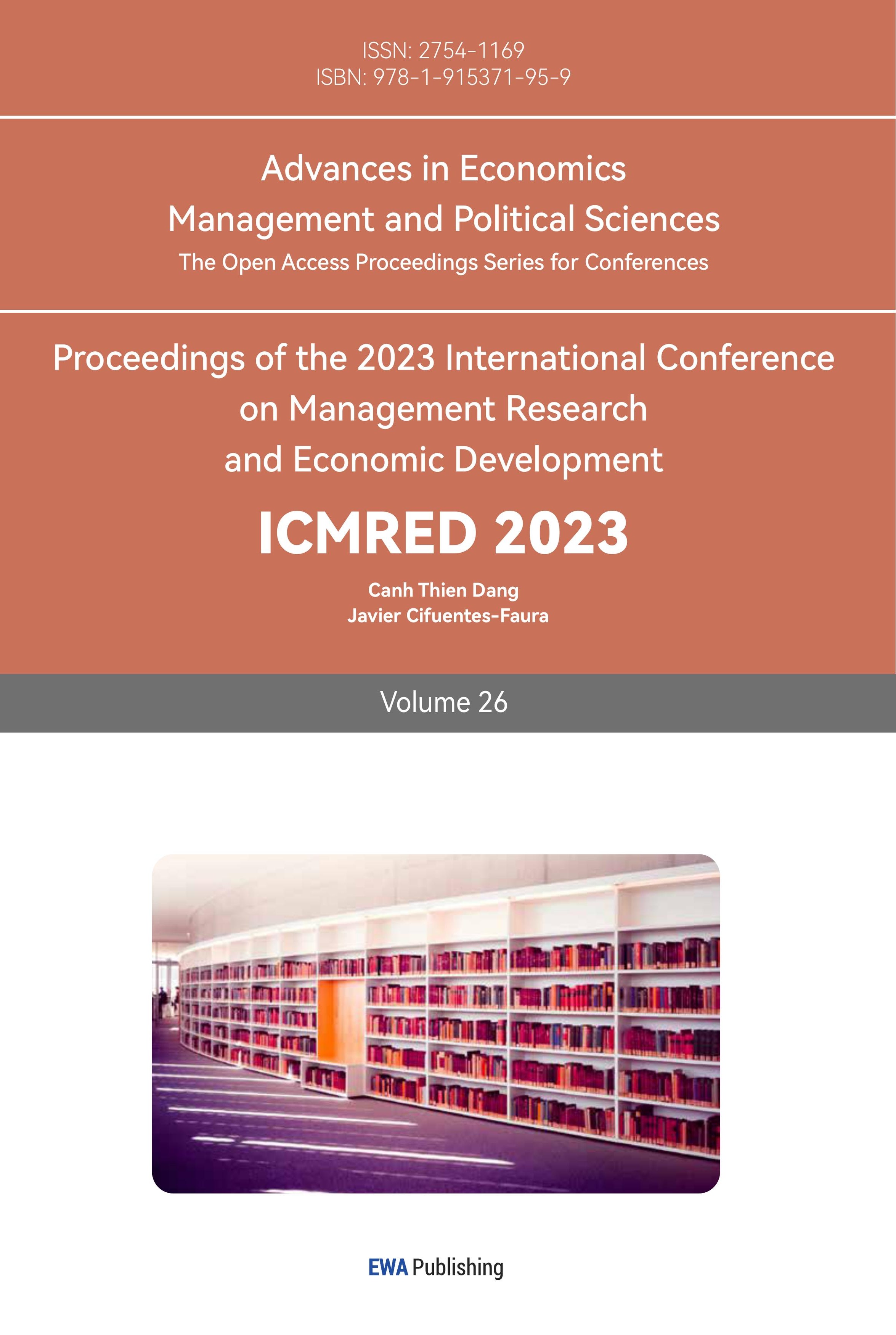References
[1]. Markowitz, H.: Portfolio Selection. The Journal of Finance 7(1), 77-91 (1952).
[2]. Shan, C.Y., Tang, Y.J., Wang, Q., Zhang, C.: The Diversification Benefits and Policy Risks of Accessing China.s Stock Market. Journal of Empirical Finance 66, 155-175(2022).
[3]. Prasad, E. S., Rajan, R. G.: Modernizing China's growth paradigm. American Economic Review 96(2), 331-336 (2006).
[4]. Zhang, Y.C.: An Empirical Study of Effective Asset Portfolios in Shanghai and Shenzhen Stock Markets: 1994-1996. Economical Science (05), 33-39 (1997).
[5]. Yu, H.Q., Li, L.: Markowitz’s Portfolio Model and Its Empirical Research Based on Security Market in China, Journal of Gansu Science 25(3), 146-149 (2013).
[6]. Zeng, Y.M., Zhang, J., Zhang, Q.: Empirical Study of the Markowitz Model in the Optimal Portfolio Selection in the Stock Market, Journal of Xiangtan Normal University (Social Science Edition) 31(4), 88-91 (2009).
[7]. Investopedia, https://www.investopedia.com/, last accessed 2016/11/21.
[8]. Sun, L.B.: An Empirical Study of Markowitz's Portfolio Theory based on Python. Times Finance 779(25), 46-47 (2020).
[9]. Li, S.M., Xu, P.: Markowitz Portfolio Theory Model Application Research, Economical Science (01), 42-51 (2000).
[10]. Li, Y., Yu, L.X.: Optimal Portfolio Analysis based on Markowitz Theory. Monthly Accounting Magazine 674(22), 53-55 (2013).
Cite this article
Wu,J. (2023). Portfolio Optimization Based on Main Board Stocks in China. Advances in Economics, Management and Political Sciences,26,218-226.
Data availability
The datasets used and/or analyzed during the current study will be available from the authors upon reasonable request.
Disclaimer/Publisher's Note
The statements, opinions and data contained in all publications are solely those of the individual author(s) and contributor(s) and not of EWA Publishing and/or the editor(s). EWA Publishing and/or the editor(s) disclaim responsibility for any injury to people or property resulting from any ideas, methods, instructions or products referred to in the content.
About volume
Volume title: Proceedings of the 2023 International Conference on Management Research and Economic Development
© 2024 by the author(s). Licensee EWA Publishing, Oxford, UK. This article is an open access article distributed under the terms and
conditions of the Creative Commons Attribution (CC BY) license. Authors who
publish this series agree to the following terms:
1. Authors retain copyright and grant the series right of first publication with the work simultaneously licensed under a Creative Commons
Attribution License that allows others to share the work with an acknowledgment of the work's authorship and initial publication in this
series.
2. Authors are able to enter into separate, additional contractual arrangements for the non-exclusive distribution of the series's published
version of the work (e.g., post it to an institutional repository or publish it in a book), with an acknowledgment of its initial
publication in this series.
3. Authors are permitted and encouraged to post their work online (e.g., in institutional repositories or on their website) prior to and
during the submission process, as it can lead to productive exchanges, as well as earlier and greater citation of published work (See
Open access policy for details).
References
[1]. Markowitz, H.: Portfolio Selection. The Journal of Finance 7(1), 77-91 (1952).
[2]. Shan, C.Y., Tang, Y.J., Wang, Q., Zhang, C.: The Diversification Benefits and Policy Risks of Accessing China.s Stock Market. Journal of Empirical Finance 66, 155-175(2022).
[3]. Prasad, E. S., Rajan, R. G.: Modernizing China's growth paradigm. American Economic Review 96(2), 331-336 (2006).
[4]. Zhang, Y.C.: An Empirical Study of Effective Asset Portfolios in Shanghai and Shenzhen Stock Markets: 1994-1996. Economical Science (05), 33-39 (1997).
[5]. Yu, H.Q., Li, L.: Markowitz’s Portfolio Model and Its Empirical Research Based on Security Market in China, Journal of Gansu Science 25(3), 146-149 (2013).
[6]. Zeng, Y.M., Zhang, J., Zhang, Q.: Empirical Study of the Markowitz Model in the Optimal Portfolio Selection in the Stock Market, Journal of Xiangtan Normal University (Social Science Edition) 31(4), 88-91 (2009).
[7]. Investopedia, https://www.investopedia.com/, last accessed 2016/11/21.
[8]. Sun, L.B.: An Empirical Study of Markowitz's Portfolio Theory based on Python. Times Finance 779(25), 46-47 (2020).
[9]. Li, S.M., Xu, P.: Markowitz Portfolio Theory Model Application Research, Economical Science (01), 42-51 (2000).
[10]. Li, Y., Yu, L.X.: Optimal Portfolio Analysis based on Markowitz Theory. Monthly Accounting Magazine 674(22), 53-55 (2013).









